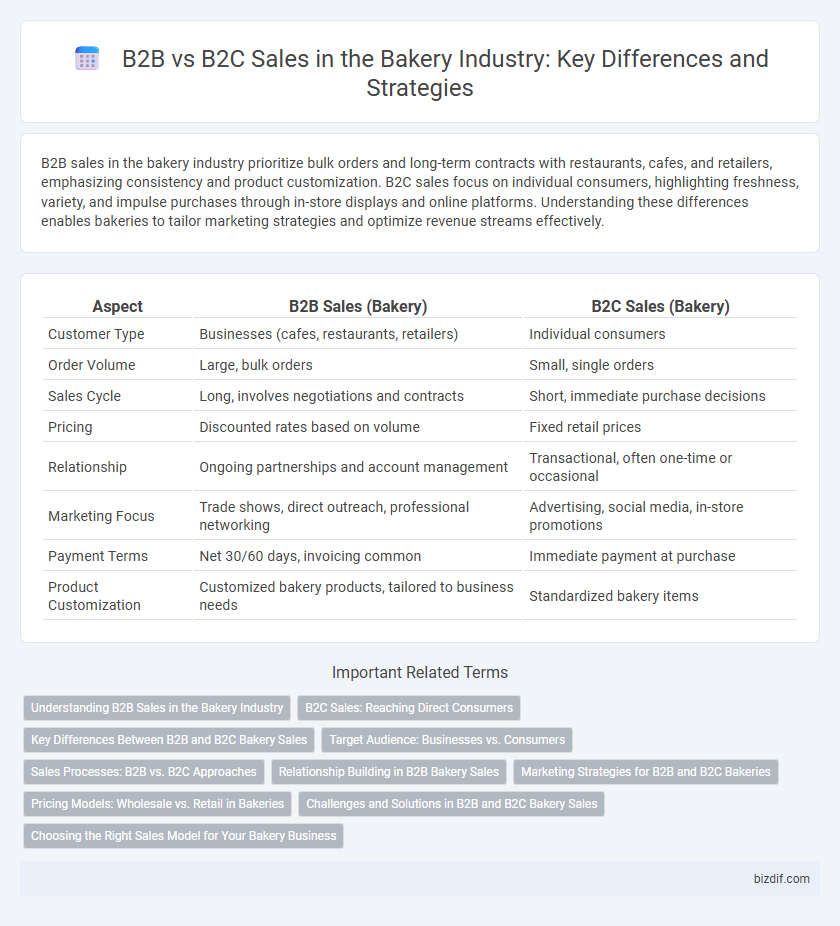B2B sales in the bakery industry prioritize bulk orders and long-term contracts with restaurants, cafes, and retailers, emphasizing consistency and product customization. B2C sales focus on individual consumers, highlighting freshness, variety, and impulse purchases through in-store displays and online platforms. Understanding these differences enables bakeries to tailor marketing strategies and optimize revenue streams effectively.
Table of Comparison
| Aspect | B2B Sales (Bakery) | B2C Sales (Bakery) |
|---|---|---|
| Customer Type | Businesses (cafes, restaurants, retailers) | Individual consumers |
| Order Volume | Large, bulk orders | Small, single orders |
| Sales Cycle | Long, involves negotiations and contracts | Short, immediate purchase decisions |
| Pricing | Discounted rates based on volume | Fixed retail prices |
| Relationship | Ongoing partnerships and account management | Transactional, often one-time or occasional |
| Marketing Focus | Trade shows, direct outreach, professional networking | Advertising, social media, in-store promotions |
| Payment Terms | Net 30/60 days, invoicing common | Immediate payment at purchase |
| Product Customization | Customized bakery products, tailored to business needs | Standardized bakery items |
Understanding B2B Sales in the Bakery Industry
B2B sales in the bakery industry involve selling bulk quantities of baked goods to retailers, restaurants, and foodservice providers, emphasizing long-term contracts and consistent quality. The purchasing decisions are often driven by factors such as pricing, product reliability, and scalability rather than impulse or individual preferences common in B2C sales. Understanding the bakery supply chain, client business models, and regulatory compliance is crucial for successfully navigating B2B sales and fostering partnerships that support business growth.
B2C Sales: Reaching Direct Consumers
B2C sales in the bakery industry focus on reaching direct consumers through personalized marketing and product offerings that cater to individual tastes and preferences. Leveraging social media platforms and local events enhances customer engagement and drives immediate sales. Tailoring fresh, artisanal products with appealing packaging helps bakeries build brand loyalty and repeat business among everyday customers.
Key Differences Between B2B and B2C Bakery Sales
B2B bakery sales typically involve bulk orders, longer sales cycles, and customized products tailored to business needs, while B2C sales focus on smaller, frequent purchases with emphasis on impulse buying and brand loyalty. Pricing strategies in B2B prioritize volume discounts and contract agreements, whereas B2C pricing targets competitive retail rates and promotions. Marketing efforts for B2B highlight product quality, consistency, and supply reliability, contrasting with the emotional appeal and packaging aesthetics central to B2C bakery marketing.
Target Audience: Businesses vs. Consumers
B2B bakery sales target businesses such as cafes, restaurants, and grocery stores seeking bulk orders and consistent supply, emphasizing product quality and reliable delivery schedules. B2C bakery sales focus on individual consumers looking for fresh, artisanal, or specialty baked goods for personal consumption, prioritizing flavor variety and customized options. Understanding the distinct needs of these audiences drives tailored marketing strategies and product offerings in the bakery industry.
Sales Processes: B2B vs. B2C Approaches
B2B sales in the bakery industry involve complex sales processes with customized product offerings, longer decision cycles, and relationship-driven negotiations targeting bulk buyers such as retailers and foodservice companies. In contrast, B2C bakery sales emphasize quick transactions, impulse purchasing behavior, and personalized customer experiences tailored to individual consumers. Effective B2B approaches prioritize detailed product specifications, volume discounts, and contract agreements, while B2C strategies leverage branding, convenience, and customer loyalty programs to drive sales.
Relationship Building in B2B Bakery Sales
Relationship building in B2B bakery sales centers on establishing trust through consistent quality and tailored service for business clients like cafes and restaurants. Long-term partnerships thrive on transparent communication, bulk order flexibility, and reliable delivery schedules, distinguishing B2B from the transactional nature of B2C sales. Investing in client-specific solutions and responsiveness boosts client retention and fosters mutually beneficial growth in the commercial bakery sector.
Marketing Strategies for B2B and B2C Bakeries
B2B bakery sales marketing strategies prioritize relationship building, personalized communications, and bulk order incentives to attract wholesale clients like restaurants and cafes. B2C bakery marketing focuses on emotional appeal, social media engagement, and promotions targeting individual consumers to drive foot traffic and online orders. Understanding customer behavior and tailoring content for professional buyers versus everyday customers enhances conversion rates in both segments.
Pricing Models: Wholesale vs. Retail in Bakeries
Wholesale pricing in bakery B2B sales often involves bulk discounts, contract pricing, and tiered rates based on order volume, enabling consistent supply to cafes, restaurants, and retailers. Retail pricing in B2C sales is typically fixed, with markups covering packaging, presentation, and direct consumer convenience, reflecting shorter transaction cycles. Understanding these distinct pricing models allows bakeries to optimize revenue streams while catering to the specific needs of business clients and individual customers.
Challenges and Solutions in B2B and B2C Bakery Sales
B2B bakery sales face challenges such as bulk order management, strict delivery schedules, and complex pricing negotiations, requiring efficient supply chain coordination and customizable contract options to ensure client satisfaction. B2C bakery sales struggle with fluctuating customer preferences, peak demand periods, and brand differentiation, addressed by implementing dynamic marketing strategies, personalized product offerings, and enhancing in-store customer experiences. Both sales channels benefit from leveraging data analytics to forecast demand and optimize inventory, improving overall operational efficiency and profitability.
Choosing the Right Sales Model for Your Bakery Business
Selecting the appropriate sales model for your bakery business depends on target customers and revenue goals, with B2B sales focusing on bulk orders for cafes, restaurants, and retailers, offering consistent demand and larger contracts. B2C sales prioritize direct consumer engagement through retail locations or online stores, enhancing brand loyalty and maximizing profit margins on individual products. Analyzing market demand, operational capacity, and customer preferences ensures the best alignment between sales strategy and business growth objectives.
B2B Sales vs B2C Sales Infographic

 bizdif.com
bizdif.com